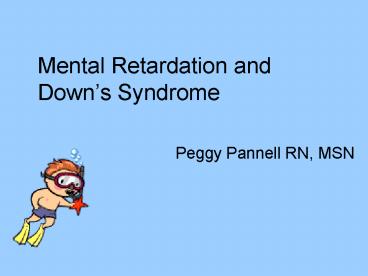Mental Retardation and Downs Syndrome
1 / 18
Title:
Mental Retardation and Downs Syndrome
Description:
The most common chromosomal abnormality of a generalized syndrome. Trisomy 21 (95 ... Hydrocephalus. Nutrition. Environmental factors. Psychiatric disorders. 5 ... –
Number of Views:664
Avg rating:3.0/5.0
Title: Mental Retardation and Downs Syndrome
1
Mental Retardation and Downs Syndrome
- Peggy Pannell RN, MSN
2
Objectives
- Define MR and Downs Syndrome
- Signs and Symptoms
- Lab and Diagnostic studies
- Treatment modalities
- Plan of care
- Emotional needs of client and family
3
Definition (Objective 1)
- Mental Retardation
- Also known as Cognitive impairment. Any type of
mental difficulty or deficiency. - Downs Syndrome
- The most common chromosomal abnormality of a
generalized syndrome. - Trisomy 21 (95)
- Translocation of 15 and 21 or 22 (3-4)
- Mosaicism (1-2)
4
Causes of MR
- Genetic
- Downs Syndrome
- Other syndromes (fragile X, etc)
- Biochemical
- Alcohol, Drugs, exposures
- Infectious
- Rubella, syphilis, kernicterus
- Unknown
- Trauma, physical agent
- Hydrocephalus
- Nutrition
- Environmental factors
- Psychiatric disorders
5
Signs and Symptoms of MR Objective 2
- Developmental Delay
- Speech
- Mobility
- Early signs
- Non-responsiveness to contact
- Poor eye contact during feeding
- Diminished spontaneous activity
- Decreased alertness to voice or movement
- Irritability
- Slow feeding
- less than a normal child of that age
6
SS of Downs Syndrome (clinical manifestations)
obj 2
- Head
- Face
- Eyes
- Nose
- Ears
- Mouth
- Teeth
- Chest
- Neck
- Abdomen
- Genitalia
- Hands
- Feet
- Musculoskeletal
- Skin
- Other
7
Diagnostic Studies Objective 3
- Chromosome Analysis
- To determine Downs and other syndromes
- Standardized test
- Vineland Social Maturity Scale
- AAMR Adaptive Behavior Scale
- Classification
- Educable Mentally Retarded (EMR)
- Trainable Mentally Retarded (TMR)
8
Causes and Diagnostic Evaluation
- Causes
- Nonfamilial Trisomy 21 (95)
- Translocation of chrom 15, 21, 22 (3-4)
- Mosaicism (normal and abnormal chrom (1-2)
- Diagnosis
- Clinical Manifestation
- Chromosome Analysis
9
How MR is measured
- IQ (Intelligence Quotient)
- 70-75 or below
- Adaptive Skills
- 2 out of 10 possible
- Age of diagnosis
- 18 or younger
10
Intelligence Quotient
- Mild 50-55 to 70-75
- Moderate 35-40 to 50-55
- Severe 20-25 to 35-40
- Profound below 20-25
11
Adaptive Skills
- Communication
- Self Care
- Home Living
- Social Skills
- Leisure
- Will have difficulty in at least 2 areas
- Health and Safety
- Self Direction
- Functional Academics
- Community Use
- Work
12
Treatment Modalities
- Prevention
- Educate Child/Family
- Early Intervention
- Self Care Skills
- Optimum Development
- Play/Exercise
- Downs Syndrome
- Communication
- Discipline
- Socialization
- Sexuality
- Future Care
- Hospitalization
13
Treatment Modalities DS
- Corrective surgery for anomalies
- Cosmetic surgery for physical stigmata
- Regular evaluation of sight and hearing
- Periodic testing of thyroid
- Evaluate for atlantoaxial instability (for
sports)
14
Emotional Needs
- During
- Initial Diagnosis
- At birth or later
- Hospitalization/medical care
- Developmental years
- Planning Future Care
- For complex care
- Respite care
- Permanent care giver
15
Plan of Care
- Diagnosis
- Altered Growth and Development Related to
impaired cognitive functioning. - Goal
- Child will exhibit evidence of appropriate growth
and development behaviors for age and abilities. - Page 1260
16
Plan
- Involve child and family in early intervention
- MS has early intervention
- McDougal Center, Region III Rehabilitation
- Assess development at regular intervals
- Varies
- Help family set realistic goals
- Not going to be a rocket scientist
- Emphasize childs normal needs
- Love, praise, acceptance, discipline, interaction
- Counsel child and parents on issues
- Sexuality, birth control, marriage, job
- Page 1260
17
Plan of Care
- Diagnosis
- Altered family processes related to having a
child with mental retardation - Goal
- Family members demonstrate acceptance of child
- Page 1260
18
Plan
- Inform family of infant problems ASAP
- Provide time to absorb and adjust
- Provide written materials
- Demonstrate your acceptance of child
- Explore families reaction to child
- Arrange for and participate in family conferences
- Assess resources and coping abilities
- Page 1260































